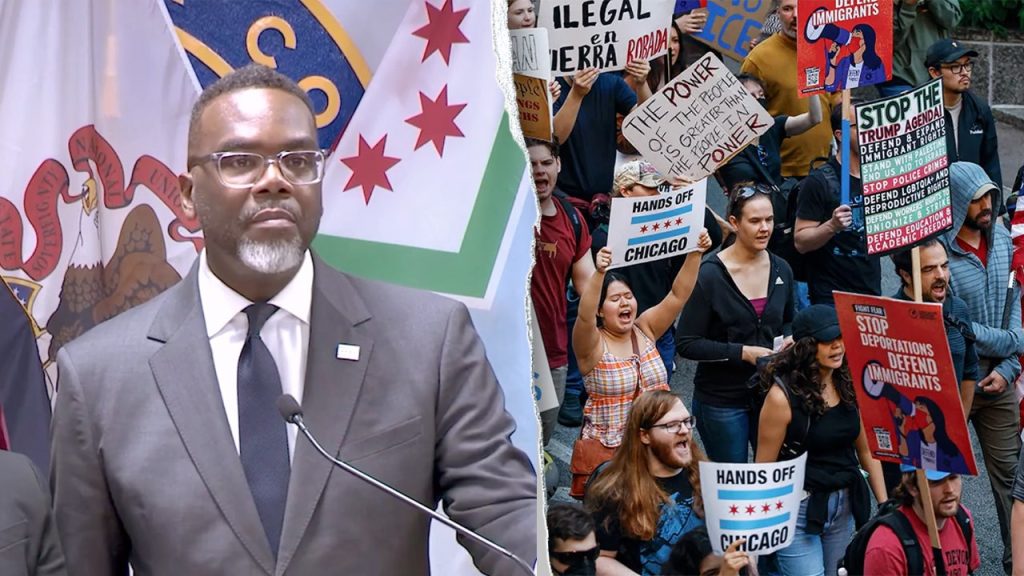Chicago Mayor Confronts Terminology in Immigration Debate
Defending Dignity in Political Discourse
In a tense exchange during a recent press briefing, Chicago Mayor Brandon Johnson strongly challenged a reporter’s use of the term “illegal aliens,” calling the language “racist” and “nasty.” The heated moment occurred when the reporter inquired about a report on city spending related to migrants that Johnson was allegedly required to submit to the White House. The mayor immediately rejected the terminology, stating, “We don’t have illegal aliens. I don’t know if that’s from some sort of sci-fi message that you wish you’ve had.” Johnson drew a powerful historical parallel to emphasize his point: “The legal term for my people were slaves. You want me to use that term too?” He insisted on more humane language, referring instead to “undocumented individuals that are human beings,” and refused to accept terminology he believed dehumanized people.
Focusing on Chicago’s Priorities and Investments
After addressing the terminology issue, Mayor Johnson redirected the conversation toward his administration’s accomplishments and priorities. He highlighted his $16.7 billion budget, which he described as making significant investments in education, transportation, housing, environmental justice, youth employment, and community safety initiatives across Chicago. Johnson also emphasized his administration’s commitment to economic fairness, stating, “We are going to challenge the ultra-wealthy to pay their fair share.” This pivot demonstrated the mayor’s attempt to focus on substantive policy matters rather than getting caught in divisive rhetoric around immigration, reflecting his administration’s broader focus on social equity and community development in Chicago.
Support from Congressional Allies on Immigration Status
Following Mayor Johnson’s comments, Representative Pramila Jayapal (D-Washington) offered support for his position on terminology, providing additional context about the legal nature of immigration violations. “It is very important that people in Illinois and across the country understand the immigration system is a civil system,” Jayapal explained. “Undocumented presence in the United States is not a criminal offense.” Her intervention reinforced Johnson’s stance from a federal legislative perspective, emphasizing the distinction between civil violations and criminal offenses in immigration law. This exchange highlighted the broader political alliances in the ongoing national debate about how immigration issues should be framed and addressed.
Johnson’s Previous Statements on Criminal Justice Reform
The mayor’s recent comments align with his consistent public stance on criminal justice issues. In previous statements, Johnson has criticized traditional law enforcement approaches, particularly those advocated by former President Donald Trump. At a news conference last month, the mayor controversially declared that “Jails and incarceration and law enforcement is a sickness that has not led to safe communities.” These remarks reflect Johnson’s progressive perspective on crime and punishment, one that prioritizes rehabilitation and addressing root causes over punitive measures. His positions have made him a polarizing figure in debates about urban crime management and immigration enforcement, especially as Chicago maintains its status as a sanctuary city.
Recent Immigration Enforcement Actions in Chicago
Despite Chicago’s sanctuary city policies, federal immigration enforcement has remained active in the area. Last week, the Department of Homeland Security (DHS) conducted what it described as “one of the most violent days” of Operation Midway Blitz, resulting in the arrest of three undocumented immigrants and six U.S. citizens in the Chicago area. This operation was launched in memory of Katie Abraham, who was killed in a drunk driving hit-and-run allegedly caused by Julio Cucul-Bol, an undocumented immigrant from Guatemala. DHS stated that the operation’s goal was to “target criminal illegal aliens terrorizing Americans in sanctuary Illinois.” These enforcement actions highlight the tension between federal immigration priorities and Chicago’s local policies under Mayor Johnson’s administration.
The Broader Context of Immigration Terminology and Policy
The confrontation between Mayor Johnson and the reporter exemplifies the larger national debate about immigration language and policy. Terms like “illegal aliens,” “undocumented immigrants,” and “migrants” carry different political and social implications, with various stakeholders advocating for language that aligns with their policy positions. Johnson’s emphatic rejection of certain terminology reflects a progressive approach to immigration that emphasizes the humanity of migrants regardless of their legal status. Meanwhile, operations like Midway Blitz demonstrate the continued federal focus on immigration enforcement, particularly targeting individuals accused of serious crimes. As cities like Chicago navigate their relationships with federal authorities and manage local responses to migration challenges, these tensions over language, law enforcement, and resource allocation remain at the forefront of urban policy discussions, with mayors like Johnson playing crucial roles in shaping both the discourse and practical responses to these complex issues.


